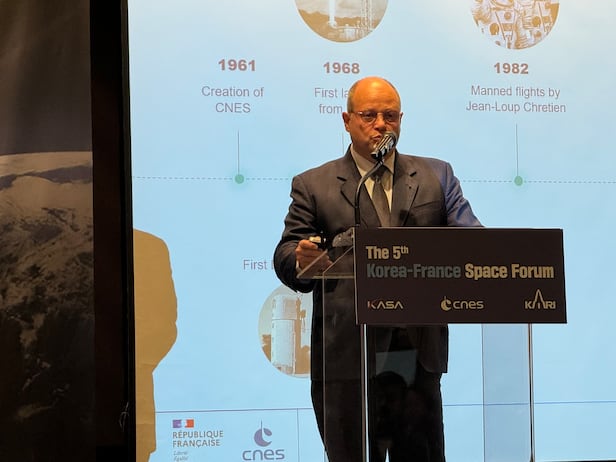France pursues strategic space autonomy while seeking cooperation with…
hitHit 941 dateDate 25-10-28 18:24
페이지 정보
본문
 Suchet Lionel (Lionel Suchet), Chief Operating Officer (COO) of the French National Centre for Space Studies (CNES), is presenting at the 5th Korea-France Space Forum held at the Four Seasons Hotel in Seoul on the 27th. /Courtesy of Park Su-hyun
Suchet Lionel (Lionel Suchet), Chief Operating Officer (COO) of the French National Centre for Space Studies (CNES), is presenting at the 5th Korea-France Space Forum held at the Four Seasons Hotel in Seoul on the 27th. /Courtesy of Park Su-hyunEurope must once again become a space power centered on France.
This remark by France President Emmanuel Macron at the Paris Air Show on Jun. 6 shows exactly the direction of the national space strategy France will pursue over the next 10 years. Macron said, “It is madness for Europe to rely on U.S. and Chinese corporations in low Earth orbit satellites,” and noted, “We must expand cooperation with India, Canada, Brazil, and Gulf countries.”
The National Center for Space Studies (CNES) is the key agency that translates the president’s policy line into a concrete strategy. Founded in 1961 by former President Charles de Gaulle, CNES is the architect and implementing body of France’s space policy, and in 1965 it succeeded in its first independent satellite launch, elevating France to the world’s No. 3 space power after the United States and the former Soviet Union. Over the next 60 years, France led the direction of Europe’s space policy by emphasizing a balance between strategic autonomy and international cooperation.
At the 5th Korea-France Space Forum held in Seoul on the 27th, CNES Chief Operating Officer (COO) Lionel Suchet presented autonomy, scientific research, industrial competitiveness, and sustainability as the four key pillars of France’s space policy. Suchet stressed in particular, “France does not see independence and international cooperation as opposing concepts,” adding, “The two are two sides of one strategic objective.”
◇ Catching both self-reliance and solidarity
CNES is pursuing national technology and solidarity at the same time through a two-track strategy that strengthens independent launch capability and core satellite development capacity while cooperating with the European Space Agency (ESA). The next-generation launch vehicle Ariane 6, jointly developed with ESA, is a representative example.
In Mar., Ariane 6 was launched carrying the Ministry of National Defense’s reconnaissance satellite CSO-3 and successfully entered orbit 800 kilometers above Earth. With its modular design, it can combine two to four solid-fuel boosters and has been evaluated as having the flexibility to handle launches from small to large satellites.
COO Suchet explained, “The Guiana Space Center in Kourou, French Guiana, which launched Ariane 6, is also strategic infrastructure symbolizing national autonomy.” The Kourou spaceport is near the equator, offering excellent launch efficiency. Thanks to this, France has the capability to launch military and civilian satellites on its own.
◇ Building a triple axis that links research, industry, and environment
Scientific research and industrial competitiveness are also priorities in France’s space policy. CNES said it is conducting exploration and climate and environmental research in cooperation with the National Aeronautics and Space Administration (NASA) and the German Aerospace Center (DLR), while policywise supporting Start - Up and small and medium-sized enterprises in France to boost global competitiveness. Through this, France is establishing itself as Europe’s space industry hub.
Sustainability is also a core pillar of space policy. CNES is institutionalizing responsible space activities by monitoring greenhouse gas and methane concentrations through satellite observations and by reducing space debris and developing eco-friendly launch vehicles. COO Suchet said, “Space development needs a responsible approach so that it does not collide with the Earth’s environment.”
France will release a new national space strategy at the end of the year. It is expected to be an important milestone for gauging the direction of Europe’s space policy and international cooperation. COO Suchet said, “I understand that Korea, along with the launch of the Korea AeroSpace Administration, has plans to ambitiously push ahead with space development,” adding, “We would be pleased if we could collaborate more with Korea.” CNES signed an agreement that day with the Korea space agency on comprehensive cooperation in space activities.
Meanwhile, the forum featured country briefings on space strategies and, by topic, technical presentations and panel discussions on ▲ strategic space autonomy ▲ space exploration ▲ next-generation orbital capabilities ▲ space services ▲ commercial space. At the business-to-business (B2B) meetings held alongside the forum, 15 Korean corporations and 17 French corporations took part and explored areas of cooperation in launch vehicles, small satellites, Earth observation solutions, on-orbit services, space situational awareness (SSA) technologies, and space medicine.
